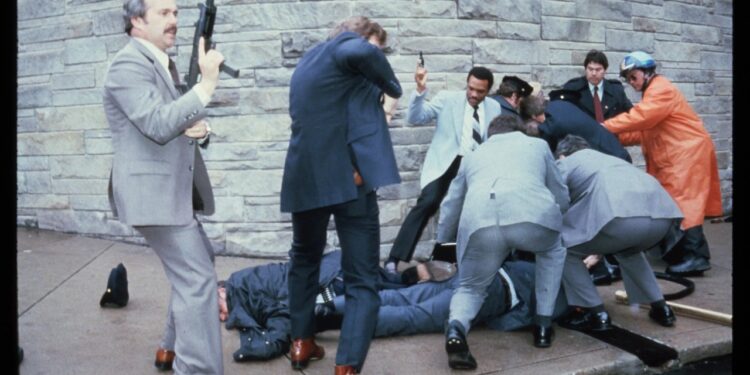On March 30, 1981, U.S. President Ronald Reagan survived an assassination attempt outside the Washington Hilton Hotel in Washington, D.C. The shooter, John Hinckley Jr., fired six shots at Reagan and his entourage as they exited the hotel after delivering a speech to the AFL-CIO. This incident became one of the most shocking events in modern American political history.
Hinckley, a 25-year-old man with a history of mental illness, had developed an obsession with actress Jodie Foster after watching the movie Taxi Driver. In an attempt to gain her attention, he plots to kill the president, mirroring a storyline from the film. Armed with a .22 caliber Röhm RG-14 revolver, he waited outside the hotel for Reagan’s exit.
As Reagan walked towards his limousine, Hinckley fired six shots within a matter of seconds. White House Press Secretary James Brady was hit in the head, suffering severe brain damage that left him partially paralyzed. Washington D.C. police officer Thomas Delahanty was shot in the neck, and Secret Service agent Timothy McCarthy took a bullet to the chest while shielding the president. The final bullet ricocheted off the presidential limousine and struck Reagan under his left arm, puncturing a lung and narrowly missing his heart.
Reagan was rushed to George Washington University Hospital, where he arrived in critical condition. Despite significant blood loss and intense pain, he maintained his composure, even joking with medical staff by saying, “I hope you’re all Republicans.” After undergoing surgery, Reagan made a full recovery and was released from the hospital on April 11, 1981. His resilience during the ordeal bolstered his public image, earning him widespread admiration.
Hinckley was immediately apprehended at the scene. Following a high-profile trial, he was found not guilty by reason of insanity in 1982 and committed to St. Elizabeths Hospital in Washington, D.C. His acquittal sparked national outrage, leading to significant reforms in U.S. laws regarding the insanity defense. After spending over three decades in psychiatric care, Hinckley was released under strict conditions in 2016.
The assassination attempt led to major security changes for U.S. presidents, including improved protection measures for public appearances. It also had lasting political effects, reinforcing Reagan’s strength as a leader and shaping his presidency. Despite the near-fatal attack, Reagan continued his term with renewed determination, ultimately serving two terms as one of the most influential American presidents of the 20th century.
newshub



Recent Comments